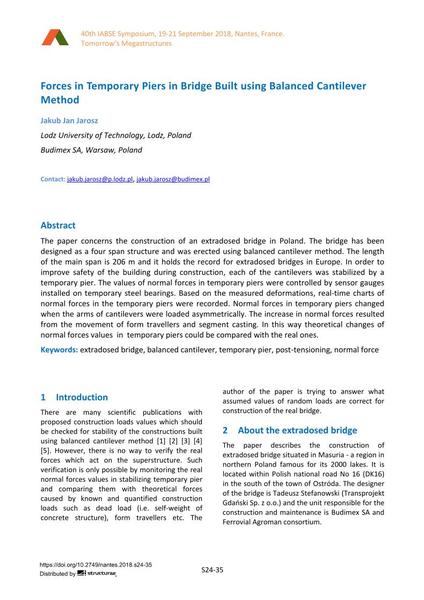Forces in Temporary Piers in Bridge Built using Balanced Cantilever Method

|
|
|||||||||||
Bibliographic Details
| Author(s): |
Jakub Jan Jarosz
(Lodz University of Technology, Lodz, Poland Budimex SA, Warsaw, Poland)
|
||||
|---|---|---|---|---|---|
| Medium: | conference paper | ||||
| Language(s): | English | ||||
| Conference: | IABSE Symposium: Tomorrow’s Megastructures, Nantes, France, 19-21 September 2018 | ||||
| Published in: | IABSE Symposium Nantes 2018 | ||||
|
|||||
| Page(s): | S24-35 | ||||
| Total no. of pages: | 8 | ||||
| DOI: | 10.2749/nantes.2018.s24-35 | ||||
| Abstract: |
The paper concerns the construction of an extradosed bridge in Poland. The bridge has been designed as a four span structure and was erected using balanced cantilever method. The length of the main span is 206 m and it holds the record for extradosed bridges in Europe. In order to improve safety of the building during construction, each of the cantilevers was stabilized by a temporary pier. The values of normal forces in temporary piers were controlled by sensor gauges installed on temporary steel bearings. Based on the measured deformations, real-time charts of normal forces in the temporary piers were recorded. Normal forces in temporary piers changed when the arms of cantilevers were loaded asymmetrically. The increase in normal forces resulted from the movement of form travellers and segment casting. In this way theoretical changes of normal forces values in temporary piers could be compared with the real ones. |
||||
| Keywords: |
balanced cantilever normal force extradosed bridge post-tensioning temporary pier
|
||||
